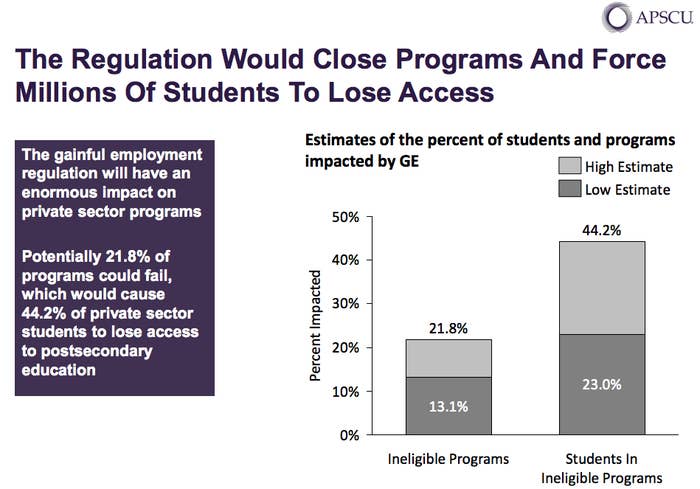
With thousands of programs under threat and millions of dollars in revenue at stake, a for-profit college lobbying association made it clear today that it has no plans to submit quietly to Department of Education regulation. In strongly worded comments submitted today to the department, the Association of Private Sector Colleges and Universities (APSCU) hit back against the government's proposed regulations of the sector as "flawed, arbitrary and biased." APSCU represents more than 1,400 for-profit colleges nationwide, including major companies like DeVry, EDMC, and Kaplan.
Today marks the deadline for the public to comment on the so-called "gainful employment" regulations that proposed by the federal government in March and target for-profit college degree programs that graduate students with high levels of debt and low earnings prospects.
Under the regulations, students enrolled in programs that fail one of a pair of metrics — the ratio of debt to earnings and the loan default rate — would lose their access to federal loan funding, essentially forcing the programs to close down. Most for-profit colleges receive as much as 90% of their revenue from federal money.
Early estimates showed that between 20 and 40% of all students enrolled at for-profit colleges would be affected by the regulations. Many of them are enrolled in two-year associate's degree programs such as nursing and business administration, and in certificate programs in areas like culinary arts and interior design, which offer low earnings prospects but can still sink students into tens of thousands of dollars of debt. For-profit college programs are more expensive than similar programs at community colleges.
APSCU's comments today hit a series of now-familiar points for the for-profit sector, including allegations that the regulations are unfair because they do not apply to public and private nonprofit colleges, which also graduate students with high levels of unmanageable debt. Currently, the rules apply only to for-profit colleges and vocational non-degree programs at community colleges.
APSCU also echoed an industry refrain that the regulations unfairly target poor and minority students, millions of whom, the group says, will be left stranded without access to postsecondary education if the programs they attend are eliminated.
Proponents of the regulation say that it is designed to protect those especially vulnerable students, and that targeting for-profit colleges makes sense because their students default on loans at extremely disproportionate rates. While just 14% of college students attend for-profit colleges, they make up almost half of all defaults, the Obama administration said. For-profit colleges have also been targeted recently by state attorneys general for predatory and misleading enrollment tactics.
APSCU also commissioned a Northwestern professor to write a 103-page report, released today, on the regulations. At the report's center is the allegation that the metrics imposed by the Department of Education are arbitrary and do not accurately measure programs' success.
If that charge sounds familiar, it's because APSCU made the same one in a 2012 lawsuit against the first round of gainful employment regulations. Much of the original regulation was thrown out as a result of that suit; the March 2014 rules are the government's second attempt at regulating the industry.
After the public comment period closes today, the proposed regulations will return to the department to be finalized.
